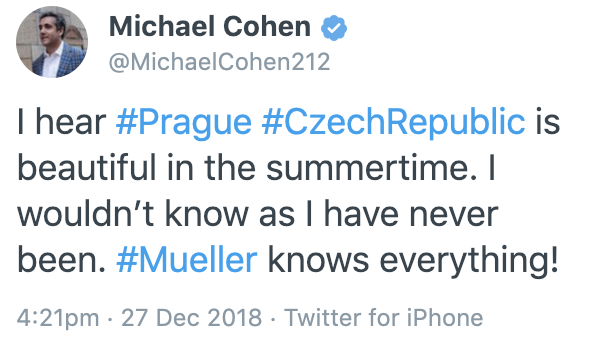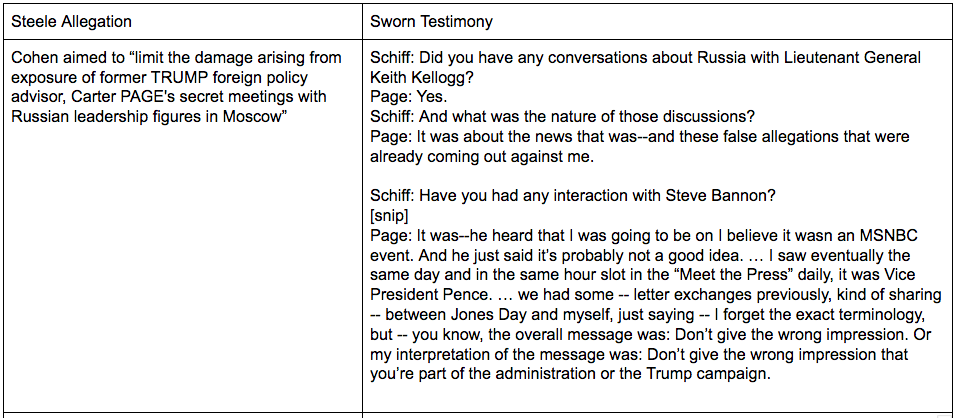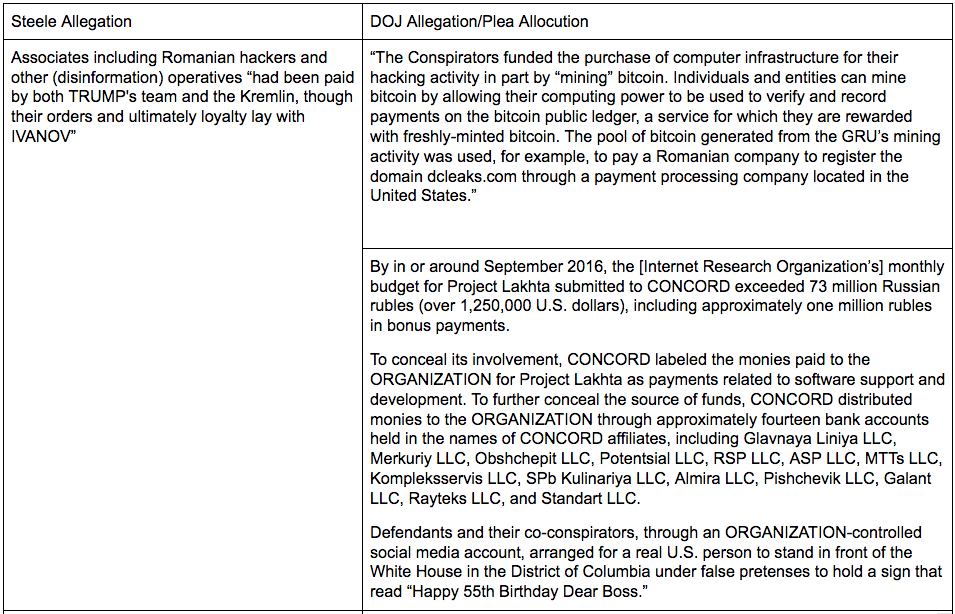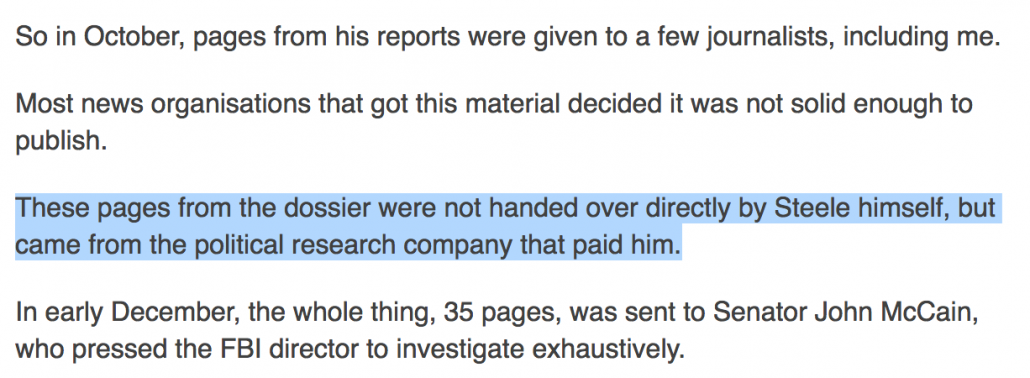Someone Has Already Been Charged for Most of the Actions the Steele Dossier Attributes to Michael Cohen
Because of a McClatchy story claiming two new details corroborating a Steele dossier claim that Michael Cohen had a meeting with people serving the interests of Putin’s Administration, people have gotten themselves into a tizzy again about what a smoking gun it would be if the allegations in the Steele dossier were proven true.
It’s an utterly bizarre tizzy, both because the allegations in the Steele dossier not only don’t match some more damning allegations Cohen has already pled guilty to, but because Mueller has already charged other people for some of the allegations about Cohen made in the dossier. In other words, the McClatchy story has people excited about the wrong allegations, rather than focusing on the damning things Cohen (and others) have already been charged with.
Indeed, most functional allegations made in the Steele dossier have already been publicly explained in either court filings or sworn testimony. That doesn’t rule out that Cohen had a role in some of them, however. Indeed, one detail from Cohen’s SDNY plea — that among the things Trump Organization reimbursed Cohen for in January 2017 was a $50,000 payment to a tech services company — actually could confirm a detail made in the dossier. But generally, Mueller and other entities have already explained away many of the allegations made against Cohen in the dossier.
I’ve put the substantive claims the Steele dossier made about Cohen below. I’ll take each and show public reporting that explains who did something attributed to Cohen in the dossier.
Cohen met with Russian Presidential Administration Legal Department officials
The central allegation involving Cohen is that he met with people from Putin’s Presidential Administration’s legal department or, in a later version, someone acting on their behalf.
By the time that allegedly happened in August or maybe September, however, Cohen had already established a paper trail with someone more central than some anonymous lawyers. Cohen’s Mueller plea describes Cohen receiving an email on January 20, 2016 from Dmitry Peskov’s personal assistant and shortly thereafter calling her. Somehow Mueller knows that the assistant “asked detailed questions and took notes.” The day after Cohen spoke with the personal assistant, someone from Putin’s office called Felix Sater.
Given that Cohen made reservations to travel to St. Petersburg (for a possible meeting directly with Putin) on June 9, then canceled those reservations on June 14 (after Russia’s role in the DNC hack was made public), those communications about a Trump Tower deal surely tie to the hack-and-leak operation.
It’s certainly possible that, later in the summer (or in the fall, during Cohen’s known trips to London), Cohen would attempt to reschedule that meeting, though the purpose was originally and probably would remain more central to a quid pro quo trading a Trump Tower and election assistance for sanctions relief and policy considerations. But having already exchanged easily collectable communications directly with Peskov’s office (whom the dossier calls “the main protagonist” in the operation), it’s not clear how helpful using Rossotrudnichestvo would be to hide the Trump role. Furthermore, there are other known cut-outs for related matters, including Steele dossier source Sergei Millian and the Agalrovs.
Cohen aimed to contain the Paul Manafort scandal
The three Cohen reports in October all claim that Cohen got involved to tamp down scandals connecting Trump to Russia. That’s not, at all, far-fetched. After all, Cohen was Trump’s fixer and he told a bunch of lies to Congress in an effort to hide Trump’s Moscow Project.
That said, a filing explaining why Mueller might have to mention the Trump campaign in Manafort’s aborted DC trial and a filing in Alex Van der Zwaan’s prosecution show that Manafort and Rick Gates themselves — with the direct involvement of Oleg Deripaska associate Konstantin Kilimnik — worked to contain this scandal.
As Mueller laid out in numerous ways, the Manafort-Gates-Kilimnik team went on a crime spree in the fall trying to cover up their past activities with Russian-backed oligarchs.
Indeed, that a claim that Cohen managed this pushback (and its timing) appeared in the dossier is particularly tantalizing for two reasons. First, one of the things Manafort reportedly lied about after agreeing to cooperate with Mueller pertained a boat trip he took with Tom Barrack; Mueller seems to know that Kilimnik joined the two men. If that happened, then it would show that someone did indeed hold a meeting in August to contain the damage of Manafort’s burgeoning scandals, but that meeting would have been between a key Trump funder, Manafort himself, and someone suspected of ongoing ties with GRU, the agency that conducted the DNC hack.
More intriguing still, as I noted above, Kilimnik was Manafort’s go-between with Oleg Deripaska. That’s interesting because in 2016, Christopher Steele was attempting to convince DOJ’s Bruce Ohr that Deripaska could be a useful source on Russian organized crime. If Steele thought Deripaska would be a useful source for DOJ, he may well have been relying on Deripaska himself. If so, the report that Cohen (who in fact did have communications with Peskov!) was containing the damage of Manafort’s ties to Russian oligarchs might be an attempt to distract from the way that a Russian oligarch was actually working through his handler, Kilimnik, to minimize that damage himself.
Cohen aimed to contain the Carter Page scandal
It likewise seems unlikely that Cohen was the one to try to contain the Carter Page scandal. While he shouldn’t be relied on for anything, several claims in Page’s testimony to HPSCI provide an alternate explanation about who was containing the scandal tied to him.
Page denied ever speaking to Cohen.
But he did describe Keith Kellogg discussing the allegations with him. And he did describe Steve Bannon, both by himself and with the assistance of Trump’s election lawfirm, Jones Day, trying to minimize the Page scandal.
That’s consistent with a number of on-the-record claims from the campaign in the days following Page’s resignation in September. Which is to say, minimizing the Page scandal fell to the campaign itself.
The people who carried out the information operation had been paid by Russia and Trump
The three initial reports on Cohen came, in suspiciously quick succession, in October, after the number of reporters briefed on the Steele dossier started to expand.
The one other report implicating Cohen was the December 13 report, based on intelligence Steele claimed he obtained for “free.”
The report is most notable for the legal battle it caused. The allegations most clearly resemble what Adrian Chen had identified and attributed to the Internet Research Agency year earlier and there had been extensive reporting on it all through the campaign. But instead of blaming Internet Research Agency, the report blames all that on Webzilla. And Webzilla’s owner, Aleksei Gubarev was sufficiently comfortable facing the prospect of discovery to sue BuzzFeed right away (though he lost his lawsuit a few weeks back).
There’s another reference in the report to a long debunked claim made by the Russians — that a Romanian hacker was involved, presumably an allusion to Guccifer 2.0’s half-hearted claim to be Romanian.
Still, much of that last report instead presented the most inflammatory claim in the entire dossier: that Trump’s campaign had helped pay for the information operation targeting Hillary.
On its face, that claim makes zero sense. The scenario as a whole assumes that the hack was done by independent hackers coerced to work for the FSB — perhaps people like Yevgeniy Nikulin, who had already been arrested in Prague by this point. As far as Mueller has shown publicly, however, the information operation was instead done by two entities: Russians in the employ of Putin crony Yevgeniy Prigozhin’s Internet Research Agency and officers in the employ of Russia’s military intelligence agency, GRU. In indictments of both conspirators, Mueller provided details about how the money was handled.
So we’ve already got explanations for how the information operation was funded: by Prigozhin and the Russian state, using a range of money laundering techniques to hide Russia’s role. We even have evidence that — contrary to the claim about information warriors’ loyalty to Sergei Ivanov — Prighozhin’s employees even sucked up to him in one of their dry runs getting Americans to perform IRL actions.
Cohen arranged deniable cash payments to hackers working in Europe against the Clinton campaign
As noted, the December report involving Cohen made the most incendiary claim of all: that the Trump organization planned to pay for some of the hackers that targeted Hillary.
In spite of the fact that Mueller has already explained how the two main groups of participants in the information operation got funded, this allegation gets more interesting given details laid out in Cohen’s SDNY plea. Several of his SDNY crimes, after all, involving making deniable payments, in that case to Stormy Daniels and Karen McDougal.
That shows Cohen’s modus operandi for paying off Trump’s illicit debts. Mind you, it shows that he didn’t use cash. He laundered the funds using more sophisticated money laundering. But it does show that Cohen was the guy who did that kind of thing.
Which makes this detail included — but not explained — in the same plea document intriguing.
Cohen paid some tech company $50,000 in connection with the campaign.
That’s not a whole lot of money, in any case. And if it went to pay off part of the information operation, it would have to have involved some part of the operation not yet publicly identified. Even the one known instance of Trump supporters reaching out to hackers in Europe — Peter Smith’s reported consultation of Weev — is known to have been paid for by other means (in that case, Smith’s own fundraising).
Still, it’s certainly possible that that $50,000 went to some still unidentified entity that played a role in the information operation that, for some reason, didn’t get paid for by Putin’s cronies or the Russian state.
As I disclosed in July, I provided information to the FBI on issues related to the Mueller investigation, so I’m going to include disclosure statements on Mueller investigation posts from here on out. I will include the disclosure whether or not the stuff I shared with the FBI pertains to the subject of the post.
18 October
Speaking separately to the same compatriot in mid-October 2016, a Kremlin insider with direct access to the leadership confirmed that a key role in the secret TRUMP campaign/Kremlin was being played by the Republican candidates personal lawyer Michael COHEN. [redacted line]
19 October
1. Speaking in confidence to a longstanding compatriot friend in mid-October 2016, a Kremlin insider highlighted the importance of Republican presidential candidate Donald TRUMP’s lawyer, Michael COHEN, in the ongoing secret liaison relationship between the New York tycoon’s campaign and the Russian leadership. COHEN’s role had grown following the departure of Paul MANNAFORT as campaign manager in August 2016. Prior to that MANNAFORT had led for the TRUMP side.
2. According to the Kremlin insider, COHEN now was heavily engaged in a cover up and damage limitation operation in the attempt to prevent the full details of relationship with Russia being exposed. In pursuit of this aim, COHEN had met secretly with several Russian Presidential Administration (PA) Legal Department officials in an EU country in August 2016. The immediate issues had been to contain further scandals involving MANNAFORT’s commercial and political role in Russia/Ukraine and to limit the damage arising from exposure of former TRUMP foreign policy advisor, Carter PAGE’s secret meetings with Russian leadership figures in Moscow the previous month. The overall objective had been to “to sweep it all under the carpet and make sure no connections could be fully established or proven”
3. Things had become even “hotter” since August on the TRUMP-Russia track. According to the Kremlin insider, this had meant that direct contact between the TRUMP team and Russia had been farmed out by the Kremlin to trusted agents of influence working in pro-government policy institutes like that of Law and Comparative Jurisprudence. COHEN however continued to lead for the TRUMP team.
[snip]
The Kremlin insider was unsure of the identities of the PA officials with whom COHEN met secretly in August, or the exact date/s and locations of the meeting/s. There were significant internal security barriers being erected in the PA as the TRUMP issue became more controversial and damaging. However s/he continued to try to obtain these.
20 October
1. Speaking to a compatriot and friend on 19 October 2016, a Kremlin insider provided further details of reported clandestine meeting/s between Republican presidential candidate, Donald lawyer Michael COHEN and Kremlin representatives in August 2016. Although the communication between them had to be cryptic for security reasons, the Kremlin insider clearly indicated to his/her friend that the reported contact/s took place in Prague, Czech Republic.
2. Continuing on this theme, the Kremlin insider highlighted the importance of the Russian parastatal organisation, Rossotrudnichestvo, in this contact between TRUMP campaign representative/3 and Kremlin officials. Rossotrudnichestvo was being used as cover for this relationship and its office in Prague may well have been used to host the COHEN Russian Presidential Administration (PA) meeting/s. It was considered a “plausibly deniable” vehicle for this, whilst remaining entirely under Kremlin control.
3. The Kremlin insider went on to identify leading pro-PUTIN Duma figure, Konstantin KOSACHEV (Head of the Foreign Relations Committee) as an important figure in the TRUMP campaign-Kremlin liaison operation. KOSACHEV, also “plausibly deniable” being part of the Russian legislature rather than executive, had facilitated the contact in Prague and by implication, may have attended the meeting/s with COHEN there in August.
Company Comment
We reported previously, in our Company Intelligence Report 2016/135 of 19 October 2016 from the same source, that COHEN met officials from the PA Legal Department clandestinely in an EU country in August 2016. This was in order to clean up the mess left behind by western media revelations of TRUMP ex-campaign manager corrupt relationship with the former pro-Russian YANUKOVYCH regime in Ukraine and TRUMP foreign policy advisor, Carter secret meetings in Moscow with senior regime figures in July 2016. According to the Kremlin advisor, these meeting/s were originally scheduled for COHEN in Moscow but shifted to what was considered an operationally “soft” EU country when it was judged too compromising for him to travel to the Russian capital.
13 December
1. We reported previously (2016/135 and /136) on secret meeting/s held in Prague, Czech Republic in August 2016 between then Republican presidential candidate Donald TRUMP’s representative, Michael COHEN and his interlocutors from the Kremlin working under cover of Russian ‘NGO’ Rossotrudnichestvo.
2. [two lines redacted] provided further details of these meeting/s and associated anti- CLINTON/Democratic Party operations. COHEN had been accompanied to Prague by 3 colleagues and the timing of the visit was either in the last week of August or the first week of September. One of their main Russian interlocutors was Oleg SOLODUKHIN operating under Rossotrudnichestvo cover. According to [redacted] the agenda comprised questions on how deniable cash payments were to be made to hackers who had worked in Europe under Kremlin direction against the CLINTON campaign and various contingencies for covering up these operations and Moscow’s secret liaison with the TRUMP team more generally.
3. [redacted] reported that over the period March-September 2016 a company called XBT/Webzilla and its affiliates had been using botnets and porn traffic to transmit viruses, plant bugs, steal data and conduct “altering operations” against the Democratic Party leadership. Entities linked to one Aleksei GUBAROV were involved and he and another hacking expert, both recruited under duress by the FSB, Seva KAPSUGOVICH, were significant players in this operation. In Prague, COHEN agreed contingency plans for various scenarios to protect the Operation, but in particular what was to be done in the event that Hillary CLINTON won the presidency. It was important in this event that all cash payments owed were made quickly and discreetly and that cyber and other operators were stood down/able to go effectively to ground to cover their traces. (We reported earlier that the involvement of political operatives Paul MANAFORT and Carter PAGE in the secret TRUMP-Kremlin liaison had been exposed in the media in the run-up to Prague and that damage limitation of these also was discussed by COHEN with the Kremlin representatives).
In terms of practical measures to be taken, it was agreed by the two sides in Prague to stand down various “Romanian hackers” (presumably based in their homeland or neighboring eastern Europe) and that other operatives should head for a bolt-hole in Plovdiv, Bulgaria where they should “lay low”. On payments, IVANOV’s associate said that the operatives involved had been paid by both TRUMP’s team and the Kremlin, though their orders and ultimately loyalty lay with IVANOV, as Head of the PA and thus ultimately responsible for the operation, and his designator successor/s after he was dismissed by president PUTIN in connection with the anti-CLINTON operation in mid August.
















